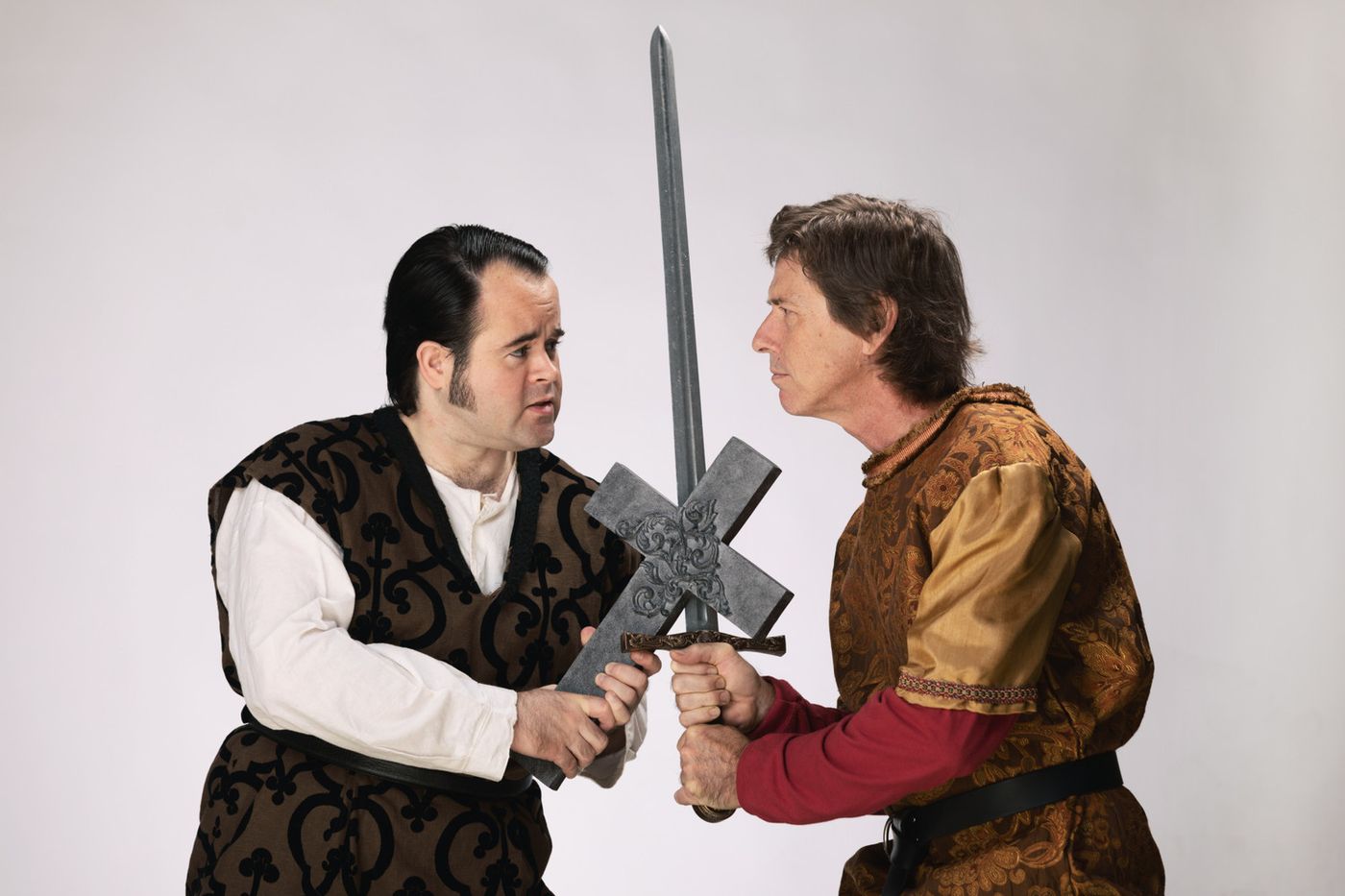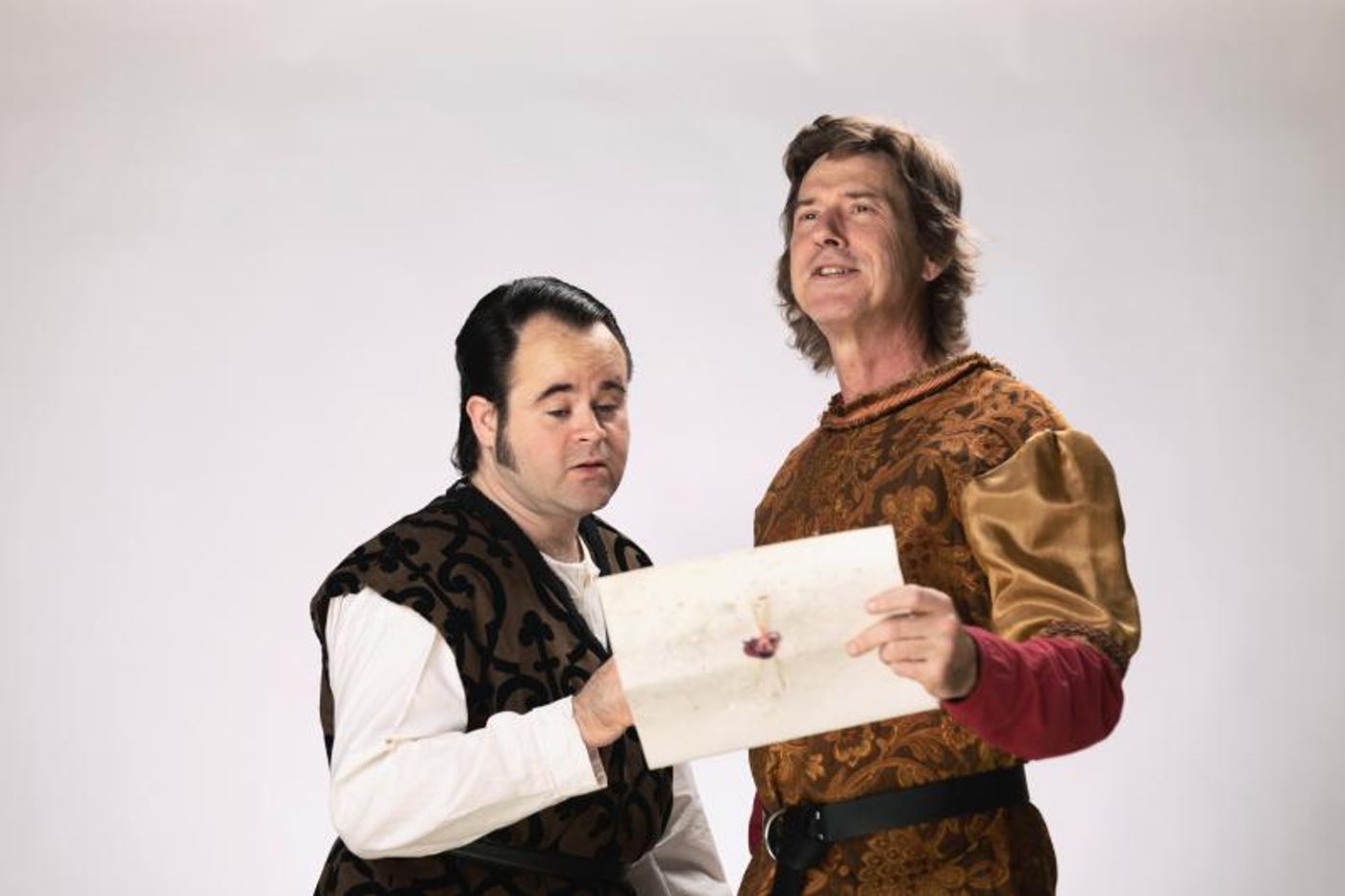Review: CP's BECKET Struggles With Loyalty, Faith, and Caring

When BECKET began at Halton Theater this past Sunday afternoon, it struck me as a vast historical tapestry. I was a bit startled to find that I was asking myself, Why didn't Shakespeare ever take up this story? As Jean Anouilh's drama rumbled majestically on, however, quite a different question gripped me: Isn't this a glorified two-hander between King Henry II and Thomas Becket, with other characters strewn around them like so many chess pieces?
This seems to be only the second play that CPCC has presented at Halton Theater - the first since Noises Off in 2012. You can infer from that history that theatre department chair Tom Hollis, who directs here for CPCC Theatre, is not a big fan of the Halton when CP isn't using it for Broadway musicals. His pre-performance invitation to the audience to find seats closer to the stage during intermission underscored his wariness.
Hollis has had to make peace with the Halton - for now, anyway - because Pease Auditorium, the longtime anchor of dramatic presentations at CP, will soon be facing the wrecking ball. A new building with theatre facilities will replace it at that razed site. Very likely, Hollis is also surprising himself a little with this Becket because scene designer Jennifer O'Kelly has filled the stage so handsomely, both horizontally and vertically.
The pillars spaced across the stage are at least three times as tall as the squat dimensions of panoramic Pease would allow, so the impressive scenery evokes Las Vegas more than London. Action does cheat forward at times to the floor that covers Halton's commodious orchestra pit, but the chief reason we hear all the actors so well is sound designer Stephen Lancaster's sure hand with the hall's famously wayward audio system.
With so little between those pillars, which must remain fixed whether we're sallying forth to a Saxon hut or to a French battlefield, there are many times that you accept O'Kelly's set as the sort of backdrop we've accustomed ourselves to in Shakespearean productions. Unfortunately, the wide range of characters that Becket engages aside from Henry, from sullen peasants to a pragmatic French king, don't deliver the rich depth we're accustomed to in the Bard's teeming histories.
Henry is selfish, lecherous, petulant, and spoiled throughout, but Becket transforms, beginning as a wily manipulator who thrives on the challenge of hunting and the thrill of battle. At his core, only fitfully awakened, are a set of scruples and a sense of honor. He is as apt as Henry to forget that he's an archdeacon of the church.
In the long arc of the story, we watch Becket, appointed by Henry as chancellor of England, helping his king to extract taxes from the church. But then Henry miscalculates and appoints Becket as the new Archbishop of Canterbury, reasoning that that his old chum will make it so much easier to shake down the church. Becket shocks his benefactor after he becomes Archbishop, renouncing the chancellorship and returning the chancellor's ring to Henry, and standing up for the church. In bare feet, renouncing worldly possessions.
In the shorter arc that plays out through much of the first act, very much along the same contours as the larger arc, we get a more vivid sense of who Henry and Becket are. After a daylong hunting excursion, the pair stop to rest and refresh at the Saxons' hut. While the father is fetching water for the king, Henry takes a fancy to his daughter. To protect the girl from Henry's ravishing, Becket professes to want her for himself. Henry yields the nameless girl up - on condition that he can demand payback later. When they return to the castle, Henry names his price. He lays claim to Becket's mistress, Gwendolyn.
You can outwit and outmaneuver a monarch, we're repeatedly shown, but power ultimately prevails. Gwendolyn and the Saxon girl are crucial to illustrating Anouilh's point, but Shakespeare would have granted them the privilege of also being people. Hollis seems to empathize with the slenderness of these roles, giving both to Gabriela Celecia, who does what she can. Becket declares that he has never really loved anyone, but that doesn't give cover to the playwright. Nor is this simply misogyny on Anouilh's part, for the English clergy - and The Pope, for that matter - are also paper-thin. Seriously, he couldn't give the Pope a name?
Ailing and decrepit, the Archbishop whom Becket will succeed is discerned easily enough amid the clergy, and Jim Greenwood gives him ample texture, the best of his multiple roles. But I can only report that Rob Craig was the Bishop of York, Roger Watson was the Bishop of York, and John DeMicco were the Huey, Dewey, and Louie of the English church. As a group, they are fine and spirited with a righteousness that is balanced with practicality. Or greed, depending on your view of the church.

Tony Wright is one of the best all-around theatre professionals we have in Charlotte, and his own company, Actor's Gym, will soon be returning to the local scene, reviving Noël Coward's Fallen Angels at Spirit Square. You can recognize various elements of Wright's greatest hits as an actor - beginning with the comically delusional Elwood P. Dowd and the swashbuckling Zastrozzi - in the sunny, insouciant wickedness he brings to Henry II. The world is Henry's playpen, so you almost laugh at his dark moments. They are petulant rather than profound.
Cole Long doesn't always convince me as a man of valor, not exactly conjuring up Laurence Olivier or Richard Burton, the Beckets of Broadway and Hollywood. Lacking that physicality may be advantageous for Long when he tackles Becket's more prominent traits, his wiliness, his deference, his fundamental decency, and his spiritual struggles to experience love and faith. With so few consequential people around Anouilh's protagonists, we don't need to pause and register that Long doesn't ooze leadership qualities. He's most credible as a loyal subject and surrogate before excelling as a fugitive.
The most affecting of Anouilh's minor characters bloom when Becket becomes openly defiant towards his king. Rick Taylor's portrait of King Louis of France has a weathered, wizened dignity to it as he offers refuge to the renegade Archbishop. Yet there is no heartbreak from His Highness when sympathy and goodwill toward the holy refugee must give way to expedience.
Accompanying Becket through his latter tribulations, the Little Monk that Becket has taken under his wing still seethes with Saxon resentment of Norman rule, nicely calibrated in Jake Dodge's portrayal. Like Gwendolyn, he's there for a purpose, but the fierce allegiance that Becket inspires in the Little Monk - contrasted with Henry's inability to keep anyone's true loyalty - strikes a deeper chord.
Aided by the age difference between them, Christy Stephens as the Queen Mother and Amy Pearre Dunn as the Young Queen transcend cardboard as the chief irritants of Henry's court after intermission. Yes, Henry is lonely without Becket by his side, but he's also afflicted.
Photos by Darnell Vennie
Reader Reviews

Videos

